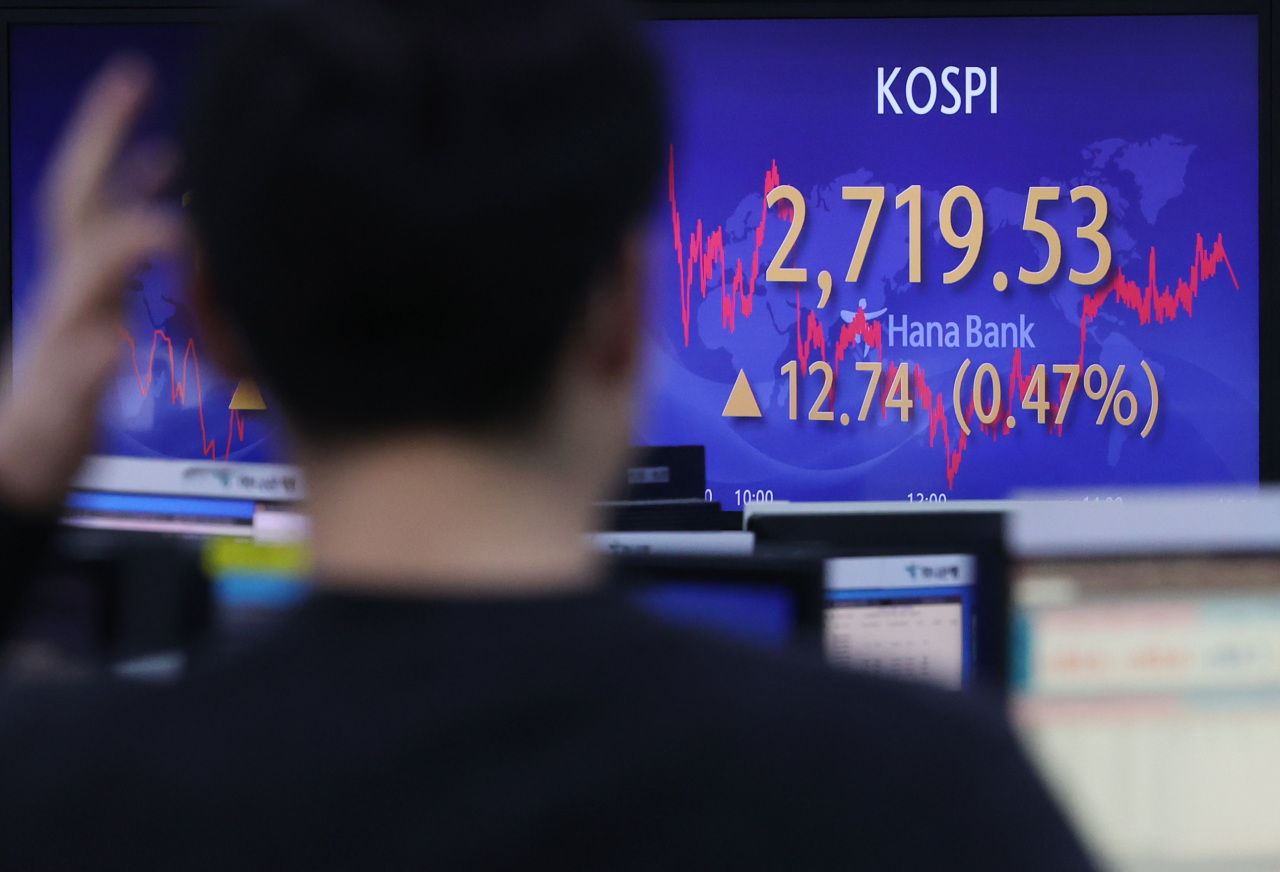Kospi slightly gains on institutional, retail buying
By Choi Si-youngPublished : Feb. 23, 2022 - 17:48

The benchmark Kospi rose Wednesday on stock purchases led by institutions and retail investors, who guarded against a sell-off by foreign investors, as investor appetite appeared affected little by developments in the Russia-Ukraine standoff.
The Kospi ended 0.47 percent, or 12.74 points, higher than Tuesday’s closing at 2,719.53, reversing the last two days of drops. The index reached an intraday high of 2,729.56 and low of 2,705.31.
Institutions and individuals snatched up shares worth 179 billion won ($150 million) and 74 billion won, respectively, while foreigners offloaded 266 billion won.
“The market is doing fairly well riding out the Ukraine conflict,” said Lee Kyung-min, an analyst at Daishin Securities, referring to trade this week, when the index posted consecutive drops.
Kim Young-hwan, a market strategist at NH Investment & Securities, said the geopolitical unrest adds to another layer of volatility to a jumpy market, which has already seen its earnings reduced on worries over a more hawkish US Federal Reserve.
But Korea should not have to worry too much about the impact from the standoff, according to Moody’s Investor Service.
“Moody’s rated issuers in APAC have limited direct exposure to Russian or Ukrainian entities, and as such we do not anticipate there would be any immediate or direct ratings impact from the situation in Ukraine,” the credit rating agency said, referring to countries in the Asia-Pacific region.
The agency noted however that the Asia-Pacific countries may see what it called “second round effects” of the conflict, like disruptions in commodity prices.
The agency added the rising prices of oil and liquefied natural gas will not impact the region much because Asian economies have long-term supply contracts for LNG.
Analysts have said an invasion could interrupt oil and natural gas shipments made by Russia, which produces 10 percent of oil the world needs and a little more than 30 percent of gas Europe uses. Germany has already halted gas projects with Russia, including pipelines in Ukraine.
The Kospi ended 0.47 percent, or 12.74 points, higher than Tuesday’s closing at 2,719.53, reversing the last two days of drops. The index reached an intraday high of 2,729.56 and low of 2,705.31.
Institutions and individuals snatched up shares worth 179 billion won ($150 million) and 74 billion won, respectively, while foreigners offloaded 266 billion won.
“The market is doing fairly well riding out the Ukraine conflict,” said Lee Kyung-min, an analyst at Daishin Securities, referring to trade this week, when the index posted consecutive drops.
Kim Young-hwan, a market strategist at NH Investment & Securities, said the geopolitical unrest adds to another layer of volatility to a jumpy market, which has already seen its earnings reduced on worries over a more hawkish US Federal Reserve.
But Korea should not have to worry too much about the impact from the standoff, according to Moody’s Investor Service.
“Moody’s rated issuers in APAC have limited direct exposure to Russian or Ukrainian entities, and as such we do not anticipate there would be any immediate or direct ratings impact from the situation in Ukraine,” the credit rating agency said, referring to countries in the Asia-Pacific region.
The agency noted however that the Asia-Pacific countries may see what it called “second round effects” of the conflict, like disruptions in commodity prices.
The agency added the rising prices of oil and liquefied natural gas will not impact the region much because Asian economies have long-term supply contracts for LNG.
Analysts have said an invasion could interrupt oil and natural gas shipments made by Russia, which produces 10 percent of oil the world needs and a little more than 30 percent of gas Europe uses. Germany has already halted gas projects with Russia, including pipelines in Ukraine.










![[Hello India] Hyundai Motor vows to boost 'clean mobility' in India](http://res.heraldm.com/phpwas/restmb_idxmake.php?idx=644&simg=/content/image/2024/04/25/20240425050672_0.jpg&u=)









